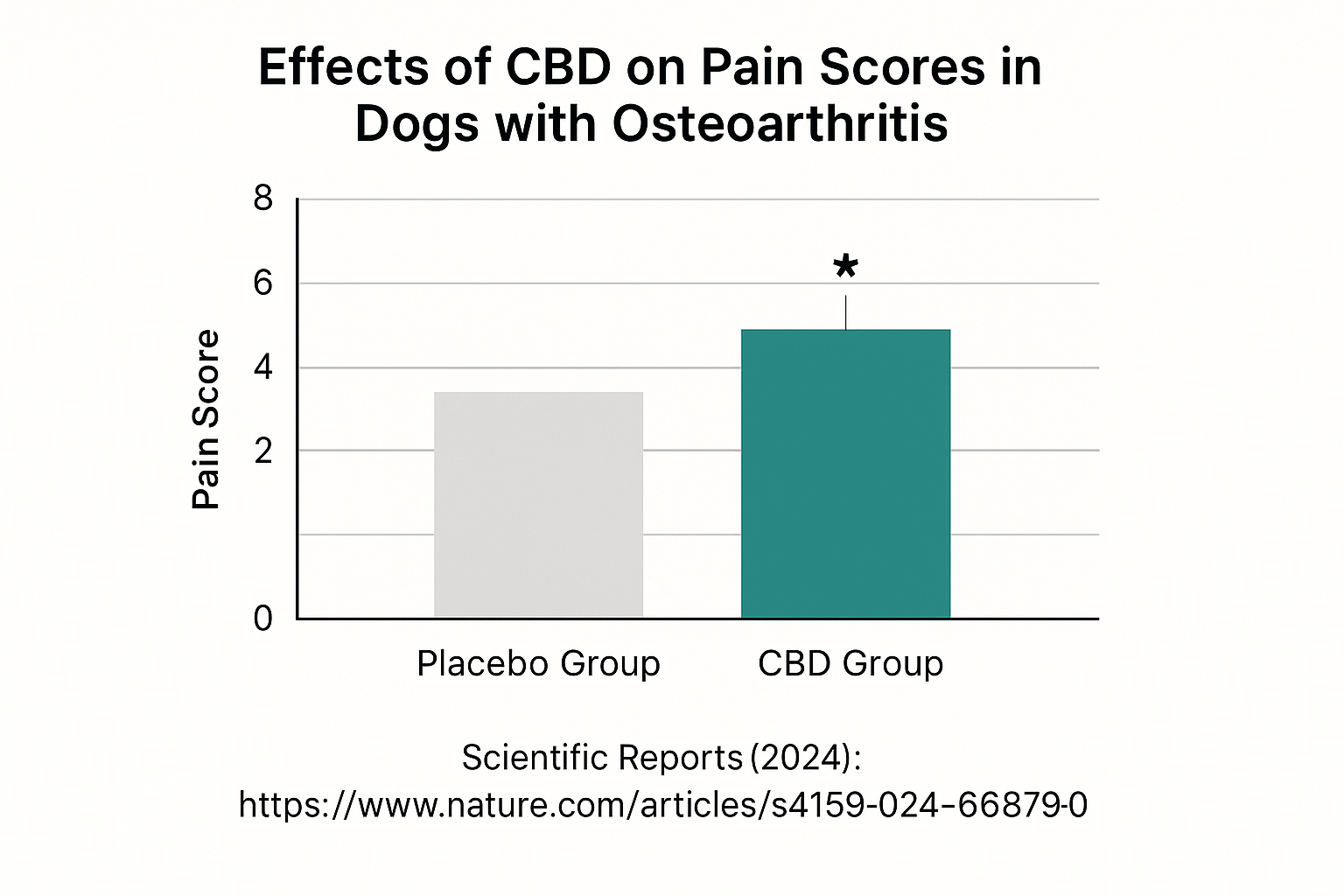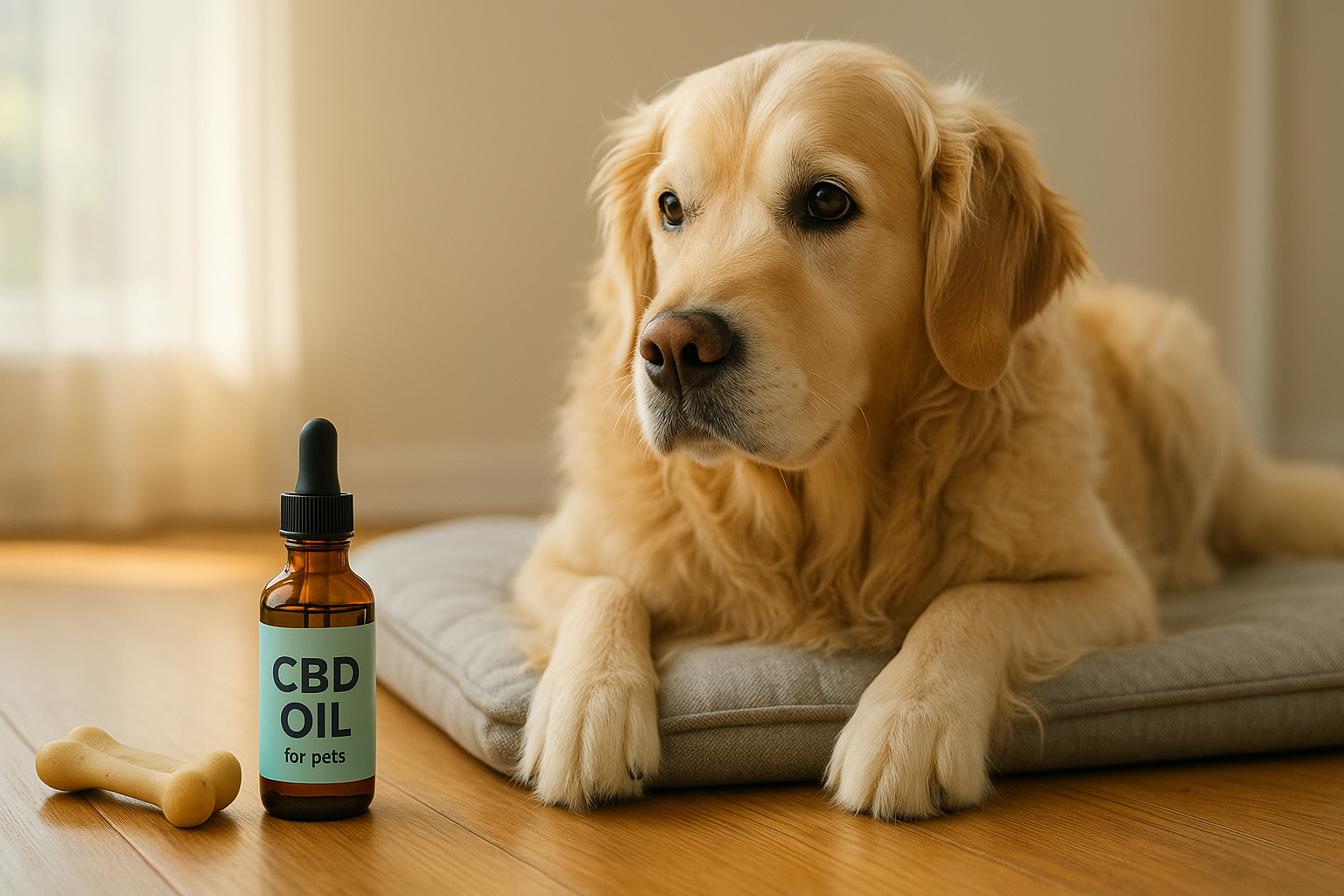Medical Disclaimer: This article is for informational purposes only and does not replace veterinary advice. Always consult your veterinarian before starting your dog on CBD or any supplement.
Seeing your dog struggle with pain, anxiety, or chronic inflammation can be heartbreaking. Many Canadian pet parents, myself included, have explored CBD for dogs as a natural way to support comfort and quality of life—especially when traditional options aren’t enough. But what does the science actually say? In this vet-reviewed guide, we’ll break down the proven benefits, safety data, and what to look for when choosing a quality CBD dog product.
🐾 Key Takeaways: CBD for Dogs
- CBD for dogs is gaining popularity for managing anxiety, joint pain, inflammation, and stress.
- Clinical trials show positive results for conditions like canine osteoarthritis and noise phobia.
- Most side effects are mild—like drowsiness or soft stool—and improve with dose adjustments.
- Look for full-spectrum, third-party-tested CBD oil for dogs with clear dosing instructions.
- Always talk to your veterinarian first, especially if your dog is on medications or has liver concerns.
Table of Contents
How CBD Works in Dogs
Understanding how CBD for dogs works starts with the endocannabinoid system—a complex network of receptors that helps regulate mood, pain, inflammation, and immune response.
The Endocannabinoid System
Dogs, like humans, have an internal system made up of CB1 and CB2 receptors. These receptors are found in the brain, nervous system, immune cells, and even the skin.
- CB1: Primarily affects the nervous system, influencing anxiety, pain perception, and sleep.
- CB2: Modulates inflammation and immune response throughout the body.
When a dog consumes cannabidiol (CBD)—whether through CBD oil, treats, or chews—it indirectly stimulates these receptors, helping restore balance in stressed or inflamed tissues.

Key Therapeutic Mechanisms
Scientific studies show CBD for dogs may work by:
- Modulating serotonin levels, improving anxiety and mood.
- Blocking pain signals at the nervous system level.
- Reducing inflammatory markers like IL-6 and TNF-α.
- Acting as an antioxidant, protecting cells from oxidative stress.
These mechanisms are why CBD dog supplements are being researched for everything from seizure control to allergic skin disease.
CBD for Canine Anxiety and Stress
Anxiety is one of the most common reasons pet parents explore CBD for dogs. Whether it’s fear of fireworks, separation anxiety, or vet visits, dogs often show stress through pacing, whining, or hiding.
Clinical Study Results
A 2023 randomized crossover study published in Frontiers in Veterinary Science evaluated dogs exposed to fireworks and found that oral CBD oil significantly reduced visible stress behaviours compared to placebo, though its effects were slightly less pronounced than trazodone source.
This aligns with what I’ve seen in practice—dogs who aren’t sedated but seem more settled and focused after taking hemp oil for dogs.
Safety & Dosing for Anxiety
- Typical dose: 1–2 mg/kg twice daily for mild to moderate anxiety.
- Onset time: 30–60 minutes for oils; longer for edibles.
- Side effects: Mild sedation, occasional diarrhea if dosed too high.
CBD interacts with the 5-HT1A serotonin receptor, which is also a target for many anti-anxiety meds—explaining its calming effect without altering a dog’s personality.
Natural Alternatives and Synergistic Herbs
Many CBD dog treats now include calming botanicals like:
- Valerian root
- Ashwagandha
- Chamomile
These ingredients may enhance CBD’s anxiolytic effect. A helpful overview of this synergy is available from Streamz-Global source.

CBD for Pain and Osteoarthritis Relief
As dogs age, joint stiffness, limping, and reluctance to move can become everyday struggles. CBD for dogs with arthritis is one of the most studied and promising uses of cannabidiol in veterinary medicine.
Trial Outcomes
A 2024 clinical trial in Scientific Reports assessed full-spectrum CBD oil for dogs with osteoarthritis. After just 4 weeks, treated dogs showed significant improvements in pain scores and mobility compared to the placebo group, with no serious adverse effects.
In my practice, older dogs often show better ease when getting up stairs or playing after a few weeks of CBD supplementation—especially when used alongside joint support like glucosamine or omega-3s.
Common Doses Used in Studies
- 2–4 mg/kg twice daily for moderate joint pain
- Best delivered via CBD tinctures (oils), which allow precise dosing
- Products with <0.3% THC ensure non-psychoactive relief
Real-World Owner Observations
According to a JAVMA survey, over 60% of pet owners who used CBD for dogs noted visible improvements in mobility, comfort, or energy levels.
These results reinforce that CBD dog supplements can be a game-changer for managing chronic pain—without the gastrointestinal upset often linked to NSAIDs.
CBD’s Anti-Inflammatory and Immune Effects
Beyond pain and anxiety, many pet owners turn to CBD for dogs with skin conditions, chronic inflammation, or immune dysregulation. That’s because CBD shows impressive anti-inflammatory and antioxidant effects in both lab studies and veterinary settings.
Biochemical Mechanisms
In canine and in vitro studies, CBD has been shown to:
- Reduce pro-inflammatory cytokines such as IL-1β, IL-6, and TNF-α
- Suppress COX-2 enzyme activity, which is often elevated in arthritis and allergies
- Act as a scavenger for free radicals, helping reduce cellular stress
One biochemical review published in MDPI Biomolecules outlines how cannabidiol exerts these effects through multiple receptor pathways, including PPARγ and TRPV1, which are involved in pain and inflammation signaling source.
This means CBD oil for dogs may offer relief for conditions like:
- Atopic dermatitis
- Inflammatory bowel disease (IBD)
- Autoimmune joint issues (e.g., immune-mediated polyarthritis)
Potential for Atopic and Autoimmune Disorders
In my experience, dogs with allergic skin disease or mild immune-mediated conditions often benefit from the immunomodulatory effects of CBD, especially when used as part of a broader treatment plan with prescription meds or omega-3s.
Safety, Side Effects, and Pharmacokinetics
While CBD for dogs is generally well-tolerated, pet parents should understand how it’s absorbed and what side effects to watch for—especially when starting a new product or adjusting doses.
Absorption and Bioavailability
Oral CBD has relatively low and variable bioavailability in dogs—typically around 13–19%. However, this improves significantly when given with a high-fat meal, such as peanut butter or wet food.
A systematic review in Veterinary Sciences found that even with modest absorption, therapeutic levels are reached for anxiety and pain when dosed correctly.
Known Side Effects
Most adverse effects of CBD oil for dogs are mild and dose-related:
- Drowsiness or sedation
- Soft stool or diarrhea
- Elevated alkaline phosphatase (ALP)—a liver enzyme (not always clinically significant)
Importantly, CBD dog supplements are non-toxic at commonly used doses. No lethal dose has been found in dogs within practical treatment ranges.

When to Avoid CBD
CBD may not be ideal in dogs with:
- Severe liver disease (due to metabolism through liver enzymes)
- Certain medications like anti-seizure drugs or NSAIDs without vet oversight
- Pregnant or lactating dogs (due to limited safety data)
Always talk to your vet, especially if your dog is already on meds or has complex health issues.
Dosing Guidelines and Choosing the Right Product
One of the most important—and confusing—parts of using CBD for dogs is knowing how much to give and which product to trust. Here’s a breakdown to guide safe, effective use.
Suggested mg/kg Ranges
Clinical studies and veterinary recommendations commonly use:
| Condition | Dose Range | Frequency |
|---|---|---|
| Anxiety | 1–2 mg/kg | Twice daily |
| Osteoarthritis | 2–4 mg/kg | Twice daily |
| Inflammation/Skin | 1–3 mg/kg | Twice daily |
Start low and adjust every 3–5 days based on response. Effects like relaxation or reduced limping may be seen in a week or two, while skin or immune improvements may take longer.
What to Look for in a Quality CBD Product
Not all CBD dog treats or oils are created equal. Choose products that are:
- Full-spectrum (includes other helpful cannabinoids and terpenes)
- THC-free or <0.3% THC
- Third-party lab tested (look for a Certificate of Analysis or COA)
- Clearly labeled with dosage per drop or chew
Avoid vague “hemp extract” claims without cannabinoid content listed.
The AKC Canine Health Foundation emphasizes the importance of using lab-tested CBD with accurate dosing info and clear safety data
Regulatory Considerations in Canada
In Canada, CBD for pets is legal when derived from industrial hemp and contains less than 0.3% THC. However:
- Vets cannot legally prescribe it under current Canadian laws
- Many rely on over-the-counter or natural health product-grade CBD options
- Always consult a veterinarian before starting—even if purchasing over-the-counter
Canadian Costs & 5-Minute CBD Readiness Checklist
Typical Cost of CBD for Dogs in Canada
Here’s a general price guide for CBD dog products available in Canadian pet markets and online stores:
| Product Type | Price Range (CAD) | Supply Duration |
|---|---|---|
| CBD oil (30 mL) | $50–$100 | 30–60 days |
| CBD treats (30 pcs) | $30–$60 | 2–4 weeks |
| CBD balm/topicals | $25–$45 | Varies |
Costs can vary based on concentration, brand quality, and shipping fees. Look for bundled packages or subscription discounts if you plan to use CBD long-term.
5-Minute CBD Readiness Checklist
Before giving your dog CBD oil or treats, ask yourself:
✅ Have I spoken with my veterinarian?
✅ Is the product clearly labeled with mg of CBD per dose?
✅ Is it third-party tested with a Certificate of Analysis?
✅ Is the CBD THC-free (<0.3%) and derived from hemp?
✅ Am I starting at the lowest dose and planning to adjust slowly?
This quick check helps avoid side effects and ensures you’re using CBD for dogs safely and effectively.
FAQs About CBD for Dogs
Here are some of the most common questions Canadian pet owners ask about using CBD for dogs:
1. Does CBD get dogs high?
No. CBD (cannabidiol) is non-psychoactive and will not get your dog high, especially when the product is labeled as THC-free or contains less than 0.3% THC.
2. How long does CBD take to work in dogs?
Onset time depends on the format:
- CBD oil: 30–60 minutes
- CBD treats or chews: 1–2 hours
Effects on anxiety or pain are often seen within days; inflammation-related issues may take 2–4 weeks.
3. Can dogs take CBD with other medications?
Sometimes. CBD for dogs may interact with drugs processed by the liver, including NSAIDs and anti-seizure meds. Always consult your veterinarian before combining.
4. Is human CBD safe for dogs?
Only if it’s pure CBD with no additives, essential oils, or sweeteners like xylitol. Ideally, use CBD products made specifically for dogs, which are dosed appropriately and lab-tested for pet safety.
5. Are there long-term effects of CBD use in dogs?
Long-term studies are ongoing, but current evidence suggests CBD is safe for extended use when dosed correctly. Monitor liver enzymes during prolonged use and work closely with your vet.
Final Thoughts: Where Science Stands Today
The scientific and real-world evidence supporting CBD for dogs is growing. From easing joint pain and mobility issues to reducing anxiety and inflammation, cannabidiol for dogs offers meaningful benefits when used responsibly.
As a veterinarian, I’ve seen CBD dog supplements improve quality of life for pets with chronic conditions—especially when integrated into a broader care plan. However, success depends on:
- Choosing high-quality, third-party-tested products
- Using correct and consistent dosing
- Collaborating with your veterinary team
While CBD for dogs isn’t a cure-all, it can be a safe, natural addition to your dog’s wellness routine—especially when conventional options fall short.





Pingback: Dogs With Noise Phobia (7 Proven Ways to Help)
Pingback: Can Dog Boredom Cause Health Issues? Vet Advice 101